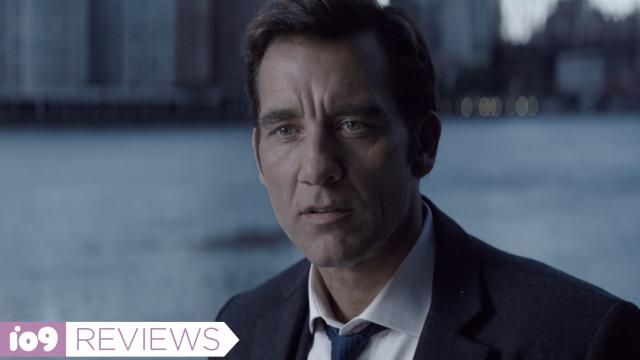In the alt-reality of Anon, everyone’s brain is hooked up to a massive shared network and authorities can see what you’re seeing whenever they want. There’s no real crime but no privacy either. If you try to keep your life to yourself, you’re a major threat to society.
Clive Owen as main character Sal Frieland in Anon. Image: Netflix
Written and directed by Andrew Niccol (Gattaca), Anon is a high-concept slice of sci-fi crime drama. The main character is Sal Frieland — played with haunted surliness by Clive Owen — a police investigator with special access to the Ether, a secure mindspace that manifests in augmented-reality overlays and stores what people see over their entire lifetime.
When he looks into theft or violent crime, the incidents can all be seen from multiple points-of-view from people’s eyes. Even a baby’s vision can be commandeered to corroborate or puncture the veracity of a suspect’s account.
We first meet Sal on his way to work, while a flood of data points swarms in his field of vision as he walks down the street. Information, advertisements, conversations (even those in foreign languages)… none of it is private. There’s one exception, though, a woman who comes up as unknown. Sal’s day verges into the abnormal when he’s called in on a murder case where a victim has his point-of-view hijacked.
He fixates on the woman he saw that fateful morning and it soon becomes apparent that she can erase her existence on multiple levels, from various databases and from the minds of others.
The woman, played by Amanda Seyfried, is only ever referred to by the screenname Anon; she becomes the main suspect in a string of murders of elite and powerful men. When police get called into another, she’s at the crime scene. Sal gives chase but she messes with his perceptions to get away.
Political pressure from above makes catching her a priority, because her technology could break the oppressive transparency that cows people into obedience. When Sal goes undercover to attempt a sting on Anon, things go horribly wrong, sending his life in a downward spiral.
Niccol’s film leans heavy on mood and quirk, building tension through its great cinematography and aesthetic designs. There’s a retro feel to the fashion, cars, and set dressing, and technology as we know it seemingly doesn’t exist anymore in a world where everyone’s at least a little cyborg. Having computers in people’s brains means there are lots of silly first-person shots and scenes where people stare off into the middle distance as they navigate UI menus.
But the ideas at the core of Anon are interesting. It’s a world where citizens’ memories share a porous membrane with their “records” — which they can share with others — and the act of forcibly looking through someone else’s eyes feels frighteningly invasive. Abuse of access can let people mess with others’ perceptions to make them hallucinate, relive trauma, and erase cherished memories.
One of the big questions Anon asks is how much do we depend on what we can see and remember to shape our sense of self. I wanted more exploration of the extrapolated singularity-adjacent consequences but Niccol prioritises the frustratingly mundane sex and violence of Anon‘s neo-noir plot beats. The end result is a movie that feels too pleased with its own cleverness to do anything more than glance at its philosophical themes.
Anon will start streaming on Netflix on May 4.
